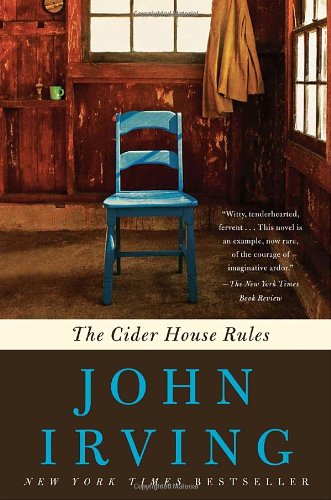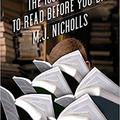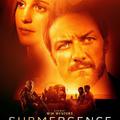John Irving: The Cider House Rules

I first read this novel in the summer of 2004. I was holding down a summer job then, and I read the majority of the book on the bus while commuting to my workplace. I didn’t mind reading the novel in small installments, because I loved the story so much that I wanted it to last forever, and I deliberately withheld myself from reading it too quickly. This haven’t happened too often in my now more than 20 years of reading practice: if I fall in love with a book, I can very rarely slow myself down and usually I don’t really want to, either. Anyway, since that beautiful summer I’ve always remembered The Cider House Rules fondly. I remember that it was a very good novel to read and get lost in, and it left a certain elusive sense of happiness in me which I’ve wanted to re-live right from the moment I finished to book for the first time.
I finally revisited the novel in 2010, and being then six years older, a bit more widely read and a lot less naive, the book proved to be a very different experience, and I’m very happy that I first read it when I was younger. I still consider this to be a good novel, and I still enjoyed reading it, but if it hadn’t been for my earlier memories I probably wouldn’t be too enthusiastic about it now and would only say that it’s certainly a good read but otherwise nothing really special. I have this feeling because compared to my current reading list and the books I tend to enjoy nowadays, this book is hopelessly old-fashioned. In recent years, I’ve got to love novels full of intriguing narrative or stylistic techniques, lovely mixtures of fiction and reality, playful tricks with narrative past and present, language games and all kinds of postmodern twists.
But The Cider House Rules contains no such intriguing tricks and games. This novel tells a story, in a relatively linear fashion. The story has its heroes and heroines (and not just nicely analyzable „characters”) who engage in different kinds of relations with one another, who committ good and bad deeds and who, in the meantime, have to come to terms with their conscience and have to make heavy moral choices. And while following their course, the reader can also make their own decisions and can even draw their own conclusions if they want to.
Now, after all this rambling about myself, a couple of words about the story: it starts in the 1920s, in Saint Cloud’s, Maine, where a liberal-minded doctor, Wilbur Larch founds a strange institution which is a mixture of an abortion clinic, a maternity hospital and an orphanage. This is the place where our hero, Homer Wells is born. Homer in time becomes the favourite orphan, the student and the proposed successor of Wilbur Larch, but the boy is disturbed by the fact that in the orphanage he’s never had the chance to make his own decisions, therefore he leaves his home when he grows up, and tries his luck in the wide world, more precisely in an apple orchard where he has ample opportunities to make all those decisions he couldn’t make in the orphanage.
Though I already suggested what this novel is not (it’s not postmodern, it’s not a play with language, and it’s not an elaborate literary game), I really don’t want to characterize this novel only with negative sentences because there’s certainly a lot to praise in The Cider House Rules. Perhaps the most important of its praise-worthy characteristics is the fact that this is an exceedingly thoughtful and beautifully structured novel which deals with several moral and social questions and dilemmas without spoonfeeding the reader with the „proper” answers and solutions.
Besides the perhaps most important topic of the novel, abortion, issues of homosexuality, free will and racial differences are also covered in the book. All these issues are presented from several points of view and we learn about them through the lives of several characters, so this way the author manages to avoid indoctrinating the reader with his very own thoughts on these subjects. And what’s even better is that all these topics are present both in theory and in practice, and it’s demonstrated in a very convincing fashion that it can easily happen that someone objects to something in theory but when it comes to real life, they still do what they’ve always been opposed to.
By the way, the characters of the novel are often forced to reassess their earlier thoughts, deeds and values and to go off the track they consider ideal (though of course sometimes they do this without any force whatsoever), and this makes them very human, palpable and vulnerable. It’s easy to feel for them, it’s easy to accept even their worst choices, and it’s easy to forgive their lies and deceptions, because despite all these the heroes are very likeable figures, and the fact that they are not perfect makes them even more authentic.
I sometimes felt while reading the novel as if John Irving had intended to write a modern epic – only with imperfect, human-scale heroes. For instance, it’s interesting to note that Irving usually characterizes his heroes with a single habit, a single physical feature or their typical word usage: Wilbur Larch keeps on sniffing ether like a maniac throughout the story; a minor female character is only characterized by her fat arms; and Homer Wells says virtually nothing in the novel expect for continuously saying „of course” with which he drives several other characters mad.
Heroism and imperfection; theory and how it can be put into practice; the decisions made by the heroes and the implications of their decisions – all these are exquisitely mixed in the novel, and despite the fact that the book is quite bulky, the story never for a minute becomes boring. For me it was a bit strange but definitely good feeling to read such a novel again: a novel which stands on its own, which is a complete world in itself and in which I could really get lost in without the necessity to be aware of the outside world or other books. While re-reading The Cider House Rules, I sometimes felt like a teenage, relatively inexperiences read, and for some fleeting seconds I could even re-live the beautiful sensation of naive reading. And this single fact definitely made it worth while for me to re-read this novel.





